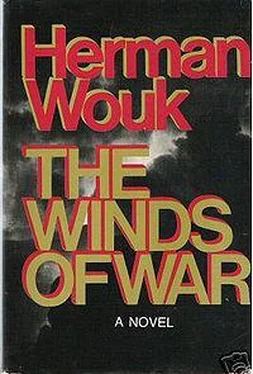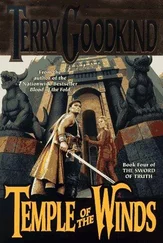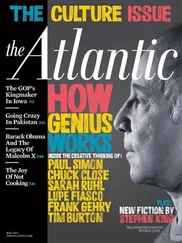Herman Wouk - The Winds of War
Здесь есть возможность читать онлайн «Herman Wouk - The Winds of War» весь текст электронной книги совершенно бесплатно (целиком полную версию без сокращений). В некоторых случаях можно слушать аудио, скачать через торрент в формате fb2 и присутствует краткое содержание. Год выпуска: 1971, Издательство: Collins, Жанр: Историческая проза, на английском языке. Описание произведения, (предисловие) а так же отзывы посетителей доступны на портале библиотеки ЛибКат.
- Название:The Winds of War
- Автор:
- Издательство:Collins
- Жанр:
- Год:1971
- ISBN:нет данных
- Рейтинг книги:4 / 5. Голосов: 1
-
Избранное:Добавить в избранное
- Отзывы:
-
Ваша оценка:
- 80
- 1
- 2
- 3
- 4
- 5
The Winds of War: краткое содержание, описание и аннотация
Предлагаем к чтению аннотацию, описание, краткое содержание или предисловие (зависит от того, что написал сам автор книги «The Winds of War»). Если вы не нашли необходимую информацию о книге — напишите в комментариях, мы постараемся отыскать её.
About the Author
Herman Wouk's acclaimed novels include the Pulitzer-Prize winning
;
;
;
;
;
; and
.
The Winds of War — читать онлайн бесплатно полную книгу (весь текст) целиком
Ниже представлен текст книги, разбитый по страницам. Система сохранения места последней прочитанной страницы, позволяет с удобством читать онлайн бесплатно книгу «The Winds of War», без необходимости каждый раз заново искать на чём Вы остановились. Поставьте закладку, и сможете в любой момент перейти на страницу, на которой закончили чтение.
Интервал:
Закладка:
It had not escaped Henry that Tudsbury’s talk, one way or another, usually came back to the theme of the United States fighting Germany.
“That might not be in the cards, Tudsbury. We’ve got the Japanese on our hands. They’re carving up China and they’ve got a first-class fighting navy, growing every month. If they make the Pacific a Japanese lake and proceed to do what they want on the Asian mainland, the world will be theirs in fifty years.”
Tudsbury said, sticking his tongue out of a corner of his smiling mouth, “The Yellow Peril.”
“It’s a question of facts and numbers,” Henry said. “How many people are there in all of Europe? Couple of hundred million? Japan is now well on the way to ruling one billion people. They’re as industrious as the Germans or more so. They came out of paper houses and silk kimonos in a couple of generations to defeat Russia. They’re amazing. Compared to what faces us in Asia, this Hitler strikes us as just more of the same old runty cat-dog fight in the back yard.”
Tudsbury peered at him, with a reluctant nod. “Possibly you underestimate the Germans.”
“Maybe you overestimate them. Why the devil didn’t you and the French go in when they occupied the Rhineland? They broke a treaty. You could have walked in there at that point and hung Hitler, with not much more trouble than raiding a girls’ dormitory.”
“Ah, the wisdom of hindsight,” Tudsbury said. “Don’t ask me to defend our politicians. It’s been a radical breakdown, a total failure of sense and nerve. I was talking and writing in 1936 the way you are now. At Munich I was close to suicide. I covered the whole thing. Czechoslovakia! Germany’s gut. Fifty crack divisions, spoiling for a scrap. The second biggest arms factory in the world. Russia and France ready at last to stand up and fight. All this, six months ago! And an Englishman, an Englishman , goes crawling across Europe to Hitler and hands him Czechoslovakia!” Tudsbury laughed mechanically and puffed at a cigarette made ragged by the breeze. “I don’t know. Maybe democracy isn’t for the industrial age. If it’s to survive, I think the Americans will have to put up the show.”
“Why? Why do you keep saying that? On paper you and the French still have the Germans badly licked. Don’t you realize that? Manpower, firepower, steel, oil, coal, industrial plant, any way you add it up, They’ve got a small temporary lead in the air, but they’ve also got the Soviet Union at their backs. It’s not the walkover it was last year and two years ago, but you still figure to win.”
“Alas, they’ve got the leadership.”
A strong hand clapped Henry’s shoulder, and a voice tinged with irony said, “ Heil Hitler !” Ernst Grobke stood there in a worn, creased navy uniform; with it he had put on a severe face and an erect posture. “Well, gentlemen, here we are. Victor, in case I don’t see you again in the confusion, where do I get in touch with you? The embassy?”
“Sure. Office of the Naval Attaché.”
“Ah!” said Tudsbury. “Our little trip to Swinemünde? So glad you haven’t forgotten.”
“I’ll do my best to include you,” said Grobke coldly. He shook hands with both of them, bowing and clicking his heels, and he left.
“Come say good-bye to Pamela,” Tudsbury said. “She’s below, packing.”
“I’ll do that.” Pug walked down the deck with the correspondent, who limped on a cane. “I have notions of matching her up with a son of mine.”
“Oh, have you?” Tudsbury gave him a waggish glance through his thick spectacles. “I warn you, she’s a handful.”
“What? Why, I’ve never met a gentler or pleasanter girl.”
“Still waters,” said Tudsbury. “I warn you.”
Chapter 4
The Henrys had only just arrived in Berlin when they were invited to meet Hitler. It was a rare piece of luck, the embassy people told them. Chancellery receptions big enough to include military attachés were none too common. The Führer was staying away from Berlin in order to damp down the war talk, but a visit of the Bulgarian prime minister had brought him back to the capital.
While Commander Henry studied the protocol of Nazi receptions in moments snatched from his piled-up office work, Rhoda flew into a two-day frenzy over her clothing, and over her hair, which she asserted had been ruined forever by the imbecile hairdresser of the Adlon Hotel (Pug thought the hair looked more or less the same as always.) She had brought no dresses in the least suitable for a formal afternoon reception in the spring. Why hadn’t somebody warned her? Three hours before the event Rhoda was still whirling in an embassy car from one Berlin dress shop to another. She burst into their hotel room clad in a pink silk suit with gold buttons and a gold net blouse. “How’s this?” she barked. “Sally Forrest says Hitler likes pink.”
“Perfect!” Her husband thought the suit was terrible, and decidedly big on Rhoda, but it was no time for truthtelling. “Gad, where did you ever find it?”
Outside the hotel, long vertical red banners of almost transparent cheesecloth, with the black swastika in a white circle at their center, were swaying all along the breezy street, alternated with gaudy Bulgarian flags. The way to the chancellery was lined with more flags, a river of fluttering red, interspersed with dozens of Nazi standards in the style of Roman legion emblems — long poles topped by stylized gilt eagles perching on wreathed swastikas — and underneath, in place of the Roman SPQR, the letters NSDAP.
“What on earth does NSDAP stand for?” Rhoda said, peering out of the window of the embassy car at the multitudinous gilded poles.
“National Socialist German Workers Party,” said Pug.
“Is that the name of the Nazis? How funny. Sounds sort of Commie when you spell it all out.”
Pug said, “Sure. Hitler got in on a red-hot radical program.”
“Did he? I never knew that. I thought he was against all that stuff. Well, it couldn’t be more confusing, I mean European politics, but I do think all this is terribly exciting. Makes Washington seem dull and tame, doesn’t it?”
When Victor Henry first came into Hitler’s new chancellery, he was incongruously reminded of Radio City Music Hall in New York. The opulent stretch of carpet, the long line of waiting people, the high ceiling, the great expanses of shiny marble, the inordinate length and height of the huge space, the gaudily uniformed men ushering the guests along, all added up to much the same theatrical, vulgar, strained effort to be grand; but this was the seat of a major government, not a movie house. It seemed peculiar. An officer in blue took his name, and the slow-moving line carried the couple toward the Führer, far down the hall. The SS guards were alike as chorus boys with their black-and-silver uniforms, black boots, square shoulders, blond waved hair, white teeth, bronzed skin, and blue eyes. Some shepherded the guests with careful smiles, others stood along the walls, blank-faced and stiff.
Hitler was no taller than Henry himself; a small man with a prison haircut, leaning forward and bowing as he shook hands, his head to one side, hair falling on his forehead. This was Henry’s flash impression, as he caught his first full-length look at the Führer beside the burly much-medalled Bulgarian, but in another moment it changed. Hitler had a remarkable smile. His downcurved mouth was rigid and tense, his eyes sternly self-confident, but when he smiled this fanatic look vanished; the whole face brightened up, showing a strong hint of humor, and a curious, almost boyish, shyness. Sometimes he held a guest’s hand and conversed. When he was particularly amused he laughed and made an odd sudden move with his right knee: he lifted it and jerked it a little inward.
Читать дальшеИнтервал:
Закладка:
Похожие книги на «The Winds of War»
Представляем Вашему вниманию похожие книги на «The Winds of War» списком для выбора. Мы отобрали схожую по названию и смыслу литературу в надежде предоставить читателям больше вариантов отыскать новые, интересные, ещё непрочитанные произведения.
Обсуждение, отзывы о книге «The Winds of War» и просто собственные мнения читателей. Оставьте ваши комментарии, напишите, что Вы думаете о произведении, его смысле или главных героях. Укажите что конкретно понравилось, а что нет, и почему Вы так считаете.












